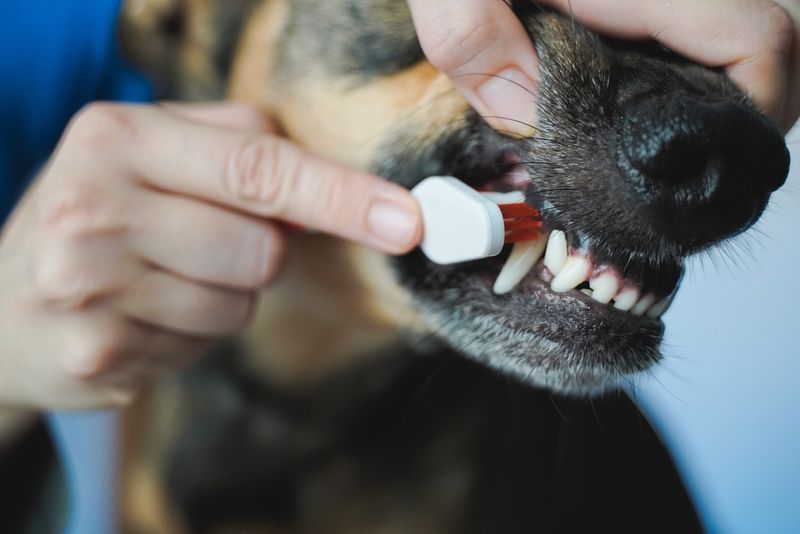While we all love our furry friends and want to provide the best care for them, some common habits may inadvertently cause harm rather than help. Our intentions are always pure, but understanding the impact of these habits on a dog’s physical and mental health is crucial. From diet choices to emotional well-being, each aspect of care plays a significant role in a dog’s happiness. This guide explores ten habits that might seem beneficial but could be affecting your dog’s well-being in unexpected ways. Let’s learn how to adjust these behaviors to ensure our dogs thrive.
Overfeeding Treats
Many dog owners view treats as an expression of love, rewarding good behavior or simply sharing a moment of joy with their pets. However, excessive treats can lead to obesity, affecting a dog’s health.
A chubby pup may look adorable, but carrying extra weight can strain joints and lead to heart issues. Moderation is key, and understanding the caloric impact of treats is essential.
Considering healthier alternatives or using low-calorie treats can help maintain a balanced diet and keep the tail wagging energetically. Remember, love isn’t measured by the number of treats given!
Skipping Regular Exercise
Exercise is a fundamental aspect of a dog’s daily routine, offering both physical and mental stimulation. Skipping regular exercise can lead to obesity and behavioral issues in dogs.
Dogs thrive on exploration, sniffing out the world with unbridled curiosity, but without regular walks, their energy might manifest as destructive behavior.
Ensuring varied and engaging exercises helps maintain fitness and mental health. Whether it’s a game of fetch or a leisurely stroll, prioritizing this time strengthens the bond and keeps both owner and pet healthy.
Using Human Products for Bathing
The temptation to use our favorite human shampoos on dogs is common, especially when they smell so delightful. However, human skin products are not designed for a dog’s skin.
Dogs have a different pH balance, and using inappropriate products can lead to skin irritation or allergic reactions.
Opting for dog-specific grooming products ensures that their skin and fur remain healthy. These products are formulated to be gentle and effective, safeguarding against potential irritants. Prioritizing their unique grooming needs is a simple step to keep them comfortable and happy.
Neglecting Dental Care
Dental health is often overlooked in canine care, yet it’s crucial for their overall well-being. Many owners neglect brushing their dogs’ teeth, leading to plaque buildup and gum disease.
Poor dental hygiene can result in painful infections and more serious health issues, as bacteria from the mouth can affect the heart and kidneys.
Incorporating dental care into a routine can be simple, using specially designed dog toothbrushes and toothpaste. Chew toys and dental treats also promote oral health, ensuring that those puppy smiles stay bright and healthy.
Ignoring Breed-Specific Needs
Each dog breed has unique characteristics and needs that influence their daily care. Ignoring these needs can lead to frustration for both the dog and owner.
For instance, a border collie requires significant mental and physical stimulation, far more than some other breeds. Neglecting such needs could lead to anxiety and behavioral issues.
Understanding and catering to these breed-specific requirements fosters a harmonious relationship. Researching or consulting with professionals can provide valuable insights into fulfilling a dog’s unique needs, leading to a happier, well-adjusted pet.
Failing to Socialize
Socialization plays a vital role in shaping a dog’s temperament, yet it’s an area that can be easily neglected, especially with young dogs.
Without exposure to different environments, people, and other animals, dogs may develop fears or aggression. Early socialization helps build confidence and adaptability.
Organizing play dates or visiting dog parks encourages positive interactions and experiences. This foundational aspect of upbringing ensures a well-rounded, friendly companion who can handle various situations without stress or fear.
Providing Inconsistent Training
Consistency in training is key to establishing clear communication and understanding between a dog and its owner. Inconsistent training can confuse a dog, leading to a lack of discipline and unpredictability.
Dogs rely on routine and clear signals to learn effectively. Changes in rules or commands can create confusion, making training efforts counterproductive.
Establishing a consistent approach, with agreed-upon commands and routines, fosters a trusting relationship and reinforces good behavior. This structured environment aids learning and helps in nurturing a well-mannered companion.
Overprotective Behavior
Showing love and concern for our pets often translates into protective behavior, but being overly protective can hinder a dog’s social skills and autonomy.
Dogs need to explore and learn about their environment to build confidence. Shielding them from every potential threat can lead to anxiety and dependence.
Allowing dogs to experience the world, with guidance, encourages independence and resilience. Balancing protection with freedom ensures they grow into well-adjusted adults capable of handling various situations with poise.
Leaving Dogs Alone for Long Periods
Dogs are social creatures and thrive on companionship, making isolation a challenging experience. Leaving them alone for extended periods can lead to anxiety and destructive behavior.
Separation anxiety is common, as dogs miss the interaction and attention they receive from their human companions. Providing mental stimulation through toys or consider pet-sitting services can alleviate loneliness.
Understanding their social nature helps in creating a balanced schedule that fulfills their need for interaction, ensuring a happy, secure pet even when left alone for short durations.
Ignoring Signs of Stress
Recognizing stress in dogs can be challenging, but it’s crucial for their emotional well-being. Ignoring signs such as excessive barking, pacing, or changes in appetite can lead to behavioral problems.
Dogs communicate their discomfort through various signs, and being attuned to these signals helps in addressing underlying issues. Providing a calm environment and understanding triggers is vital.
Consulting with veterinarians or behaviorists for persistent stress signs ensures appropriate interventions. Being proactive in addressing stress contributes to a content, well-balanced dog able to enjoy life fully.










